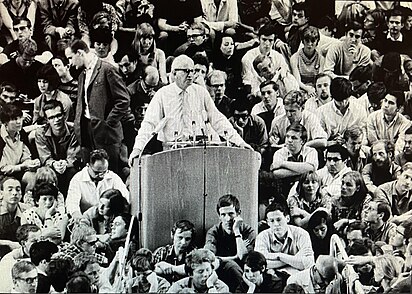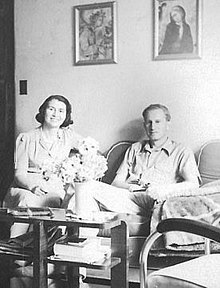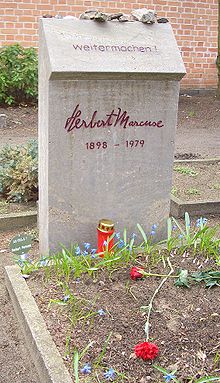Herbert Marcuse
In his written works, he criticized capitalism, modern technology, Soviet Communism, and popular culture, arguing that they represent new forms of social control.
[6] Although he never returned to Germany to live, he remained one of the major theorists associated with the Frankfurt School, along with Max Horkheimer and Theodor W. Adorno (among others).
In 1943, he transferred to the Research and Analysis Branch of the Office of Strategic Services (OSS), the precursor to the Central Intelligence Agency.
[8] After the dissolution of the OSS in 1945, Marcuse was employed by the US Department of State as head of the Central European section, becoming an intelligence analyst of Nazism.
"[11] In the post-war period, Marcuse rejected the theory of class struggle and the Marxist concern with labor, instead claiming, according to Leszek Kołakowski, that since "all questions of material existence have been solved, moral commands and prohibitions are no longer relevant."
He regarded the realization of man's erotic nature as the true liberation of humanity, which inspired the utopias of Jerry Rubin and others.
The New Left provided an attractive alternative to American society and Marcuse was able to appeal to many young individuals through his teachings of utopianism.
On July 29, 1979, ten days after his eighty-first birthday, Marcuse died after suffering a stroke during his trip to Germany.
If people are preoccupied with inauthentic sexual stimulation, their political energy will be "desublimated"; instead of acting constructively to change the world, they remain repressed and uncritical.
[22] During his years in Freiburg, Marcuse wrote a series of essays that explored the possibility of synthesizing Marxism and Heidegger's fundamental ontology, as begun in the latter's work Being and Time (1927).
This early interest in Heidegger followed Marcuse's demand for "concrete philosophy," which, he declared in 1928, "concerns itself with the truth of contemporaneous human existence.
"[23] These words were directed against the neo-Kantianism of the mainstream, and against both the revisionist and orthodox Marxist alternatives, in which the subjectivity of the individual played little role.
Its political parties and trade unions have become thoroughly bureaucratized and the power of negative thinking or critical reflection has rapidly declined.
He believed that in both capitalist and communist societies, workers did not question the manner in which they lived due to the mechanism of repression of technological advances.
These were the people whose standards of living demanded the ending of intolerable conditions and institutions and whose resistance to one-dimensional society would not be diverted by the system.
Brown,[30] Angela Davis,[31] Charles J. Moore, Abbie Hoffman, Rudi Dutschke, and Robert M. Young (see the List of Scholars and Activists link below).
Marcuse argues that genuine tolerance does not permit support for "repression", since doing so ensures that marginalized voices will remain unheard.
They would include the withdrawal of toleration of speech and assembly from groups and movements that promote aggressive policies, armament, chauvinism, discrimination on the grounds of race and religion, or that oppose the extension of public services, social security, medical care, etc.
He published his final work The Aesthetic Dimension in 1977 on the role of art in the process of what he termed "emancipation" from bourgeois society.
[37] Many themes and ambitions from Marcuse's work found embodiment in socialist feminism, especially ideas developed in Eros and Civilization.
[36][6] Jessica Benjamin and Nancy Chodorow believed that Marcuse's reliance on Freud's drive theory as the source of the desire for societal change is inadequate for both philosophers since he fails to account for the individual's intersubjective growth.
[6] Leszek Kołakowski described Marcuse's views as essentially anti-Marxist, in that they ignored Marx's critique of Hegel and discarded the historical theory of class struggle entirely in favor of an inverted Freudian reading of human history where all social rules could and should be discarded to create a "New World of Happiness."
Kołakowski concluded that Marcuse's ideal society "is to be ruled despotically by an enlightened group [who] have realized in themselves the unity of Logos and Eros, and thrown off the vexatious authority of logic, mathematics, and the empirical sciences.
"[12] The philosopher Alasdair MacIntyre asserted that Marcuse falsely assumed consumers were completely passive, uncritically responding to corporate advertising.
[39] Like many of the Frankfurt School, Marcuse wrote of "critical theory" not of "Marxism" and MacIntyre notes a similarity in this to the Right Hegelians, whom Marx attacked.
[42] "Marcuse," concluded MacIntyre, "invokes the great names of freedom and reason while betraying their substance at every important point.
"[43] Herbert Marcuse appealed to students of the New Left through his emphasis on the power of critical thought and his vision of total human emancipation and a non-repressive civilization.
[28] He is also considered among the most influential of the Frankfurt School critical theorists on American culture, due to his studies on student and counter-cultural movements on the 1960s.
[44] The legacy of the 1960s, of which Marcuse was a vital part, lives on, and the great refusal is still practiced by oppositional groups and individuals.
In the introduction to an issue of the journal New Political Science dedicated to Marcuse, Robert Kirsch and Sarah Surak described his influence as "alive and well, vibrant across multiple fields of inquiry across many areas of social relations".


